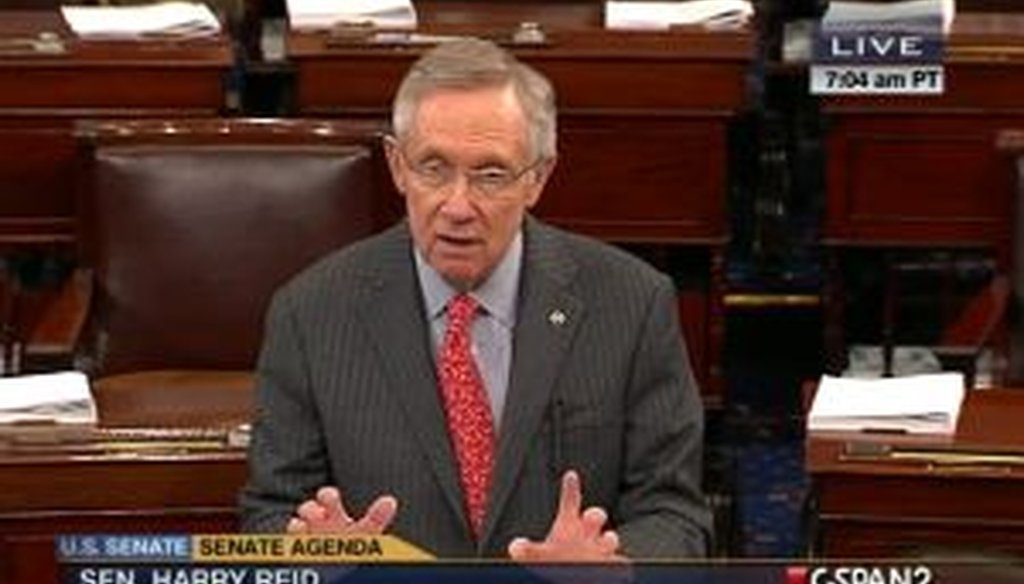

Our only agenda is to publish the truth so you can be an informed participant in democracy.
We need your help.


Senate Majority Leader Harry Reid, D-Nev., touted his chamber's role in reducing the deficit. But did he describe the amount of deficit reduction accurately?
During a recent floor speech, Senate Majority Leader Harry Reid, D-Nev., touted his chamber’s role in cutting the deficit.
"In the last two years," he said, "we have reduced the deficit by $2.5 trillion."
This claim struck us as odd, since the annual federal deficit has hovered around $1 trillion for the past three years -- and we knew from all the rhetoric about America’s deficit crisis that we hadn’t suddenly surged into a budget surplus.
So we checked into it.
First, some background on the deficit. A "deficit" refers to the amount by which spending exceeds revenues. It’s a measure calculated based on one year’s worth of spending and revenues. (The term "debt" refers to the cumulative total of all previous deficits, minus all previous surpluses.)
In fiscal year 2011, the deficit was slightly below $1.3 trillion. By the following year, it had shrunk to less than $1.1 trillion, according to the Congressional Budget Office. And by 2013, the CBO projects a deficit of $845 billion.
By year’s end, the 2013 figure could end up being higher or lower. The deficit for 2013 could shrink due to across-the-board cuts known as the sequester, which are projected to reduce spending by an additional $85 billion in 2013. And the deficit could shrink further if tax revenues exceed their projected amount (or the deficit could expand if the economy sours and tax revenues don’t meet expectations.)
But if we allow for some uncertainty, these figures show that the deficit has declined over the past two years by about $455 billion. That’s less than one-fifth of what Reid claimed.
When we contacted Reid’s office, a spokesman pointed us to a memo written in January 2013 by Sen. Patty Murray, D-Wash., who chairs the Senate Budget Committee. In this memo, Murray uses CBO figures to calculate that the deficit fell by a combined $2.4 trillion due to the two major fiscal deals of the past two years -- the legislation that ended the 2011 debt ceiling standoff and the legislation that avoided the fiscal cliff around New Year’s Day 2013. Murray did not include the sequester cuts in this calculation. (According to Reid’s prepared remarks, he had intended to say $2.4 trillion but actually said $2.5 trillion on the floor.)
But there are some asterisks included in Murray’s memo that Reid, in his floor speech, skipped over.
The $2.4 trillion in deficit reductions include projected savings over a 10-year period -- 2013 to 2022. In Washington budget wonkery, this is par for the course -- when bills are being debated, their fiscal impact is usually calculated over the bill’s first 10 years of existence.
But Reid transformed the memo’s headline number into a claim that "in the last two years, we have reduced the deficit by $2.5 trillion." This is problematic for two reasons.
First, by using the past tense "reduced," Reid implies that these deficit reductions have already taken place. Instead, they would take place in the future -- and there’s no guarantee that they will materialize.
Second, he said "in the last two years," when in fact the $2.4 trillion in deficit reduction is projected to take place over the next 10 years.
"I know this is oversimplifying and it doesn’t work this way, but a 10-year deficit reduction averages out to $240 billion per year, or $480 billion over two years," said Steve Ellis, vice president of Taxpayers for Common Sense. "That’s a big difference. Because it’s so easy to spin the numbers, precision is critically important in budget items."
Our ruling
Reid said, "In the last two years, we have reduced the deficit by $2.5 trillion."
There has been some deficit reduction in recent years, but Reid's makes it sound much larger than it actually is. The $2.4 trillion number represents a projection of what is expected (but not guaranteed) to happen in the future over a 10-year period. It is not deficit reduction that has already been banked over the past two years. We rate the statement False.
Harry Reid, Senate floor speech in Congressional Record, March 19, 2013
Harry Reid, prepared remarks for Senate floor speech, March 19, 2013
Patty Murray, memo on deficit reduction, Jan. 24, 2013
Office of Management and Budget, "Table 1.1—Summary of Receipts, Outlays, and Surpluses or Deficits (-): 1789–2017," accessed March 20, 2013
Congressional Budget Office, "The Budget and Economic Outlook: Fiscal Years 2013 to 2023," February 2013
Email interview with Steve Ellis, vice president of Taxpayers for Common Sense, March 21, 2013
Email interview with Adam Jentleson, spokesman for Harry Reid, March 20, 2013
In a world of wild talk and fake news, help us stand up for the facts.
